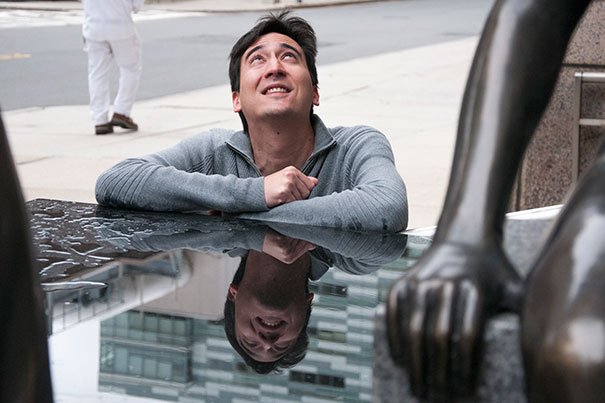
Harvard Chan School student Daniel Schlauch loved making data work for him, until he realized he could use data to fight disease. After he accepts his Ph.D. in biostatistics, he’ll be taking the fight to cancer.
Photo by Silvia Mazzocchin
For graduate the numbers add up
Daniel Schlauch is looking forward to the day when cancer’s number is up
This is one in a series of profiles showcasing some of Harvard’s stellar graduates.
Daniel Schlauch doesn’t so much love data as love making it work for him.
He downloads the numbers that describe his life, from his Fitbit, his Uber app, and wherever else they accumulate in his data-centric world.
“I keep track of all of those kinds of things in my life,” Schlauch said. “I’m not quite sure why other people don’t enjoy it as much.”
When he was 5, he learned algebra — badly, he admits — from his grandmother; he was “a big math nerd” in high school; and he earned a degree in math at Wesleyan University. He and a few data-driven friends there took a numbers approach to online poker, winning enough for a post-graduation sail through the Caribbean.
His aptitude with numbers won him a job in the Computational Biology and Functional Genomics Lab at the Dana-Farber Cancer Institute and got him interested in the biostatistics program (offered through the Graduate School of Arts and Sciences) at the Harvard T.H. Chan School of Public Health. Now Schlauch wants to follow the data into the fight against cancer at Genospace, a Cambridge-based startup whose founding team he was on, led by Professor of Computational Biology and Bioinformatics John Quackenbush in 2011.
He quotes Quackenbush in saying all advances in science have been built upon access to data.
“Right now, we have all this data. It’s a matter of going through it and turning this collection of facts into understanding,” Schlauch said.
Quackenbush’s Computational Biology and Functional Genomics lab has been something of a second home for Schlauch. He has worked there on three data problems that Quackenbush cited as “fundamentally important.” One deals with how to handle the often fuzzy line between healthy and diseased states; a second identifies and corrects subtle biases in how data are collected; and the third makes it easier to find genetic factors linked to physical traits, including disease risk and severity, in large-scale genetic studies.
“His [Ph.D.] thesis involves three very challenging problems, and his solutions to these are each potentially transformative,” Quackenbush said. “That isn’t something I could say about many other students.”
Schlauch, who grew up in Needham, the child of physicians Robert Schlauch and the late Phyllis Jen, traces his aptitude for numbers to his grandfather Chih-Kung Jen, who came from China to the United States to study physics and work at Harvard, MIT, Johns Hopkins, and the University of Pennsylvania, and grandmother Paocheng Jen, a math teacher.
“When most kids were out playing games, I remember she was trying to teach me algebra,” Schlauch said. “I think [math] works well with my brain. I like to have a structured way of thinking.”
Schlauch went to Wesleyan thinking he’d try his hand at physics, then shifted to biology and pre-med, all the while maintaining his work in math. It was the early 2000s, when online poker was gaining popularity, and he and some friends began playing, using a data-driven, problem-solving approach.
“We never had a losing month, though we had losing days and weeks,” Schlauch said. “We spent a lot of time actually quantifying how effective something should be. [And] if something was effective, but introduced a lot of variance, it wasn’t necessarily a good strategy.”
Schlauch enjoyed analyzing the numbers more than the games themselves, which he described as “tedious, stressful, and exhausting.” Still, after analyzing and discussing their wins and losses, Schlauch and his friends began to develop a new understanding of their hands’ winning chances. And some of what they found ran counter to the advice offered in books on poker.
“You learn what strategies — that everyone is using — are wrong,” Schlauch said.
After graduation, Schlauch headed south with two friends on a 37-foot sailboat. As a novice sailor, his first mission was to learn as much as possible before the leg down the East Coast ended and the trio’s only experienced sailor left for medical school. Schlauch recalled eating fish caught from the boat, offline downtime far from any internet connection, and repairs to an aging, balky engine.
“We ran aground a few times. We never put any holes in the boat but there were constantly engine problems,” Schlauch said. “There were repairs that needed to be done, but it’s often easier to fix them yourself than to find someone to do it.”
By the time they reached their turnaround point in the Grenadines, Schlauch was ready for something else.
“Our plan was to go there and to maybe make it back before hurricanes started the next year,” Schlauch said.
Back on land, Schlauch was exploring possible career paths and scheduled an interview with Quackenbush to talk about his work. Schlauch got a trial as a software developer and, Quackenbush said, “never looked back.”
Over those years, Schlauch regularly handled algorithms that helped scientists make sense of their research data, which ultimately led him to enter the Harvard Chan School’s biostatistics program in 2012.
“I was surrounded by all these people on the cutting edge of research,” Schlauch said. “I really enjoyed using their designs to implement software, but I wanted to be the one actually creating these algorithms as opposed to just implementing them.”




